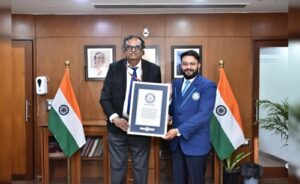Dr. Sarvepalli Radhakrishnan was the first Vice-President of India, serving from 1952 to 1962. He is one of the most respected and influential figures in Indian history, renowned not only for his political career but also for his contributions as a scholar, philosopher, and teacher.
September 5, 1888, Tiruttani, Tamil Nadu, India.
Radhakrishnan was born into a Tamil Brahmin family. He was an excellent student and showed a keen interest in philosophy from an early age.
Radhakrishnan studied at the Madras Christian College, where he earned his degree in arts and later completed his Master’s degree in philosophy.
His academic brilliance led him to a career in teaching. He became a professor of philosophy at various prestigious institutions, including the University of Mysore and Calcutta University.
He was deeply influenced by Indian philosophy, particularly Vedanta, and was recognized internationally for his efforts to bridge the gap between Eastern and Western thought.
Radhakrishnan was a distinguished scholar in comparative religion and philosophy, and his works, such as Indian Philosophy (2 volumes), remain influential.
Dr. Sarvepalli Radhakrishnan was elected as the first Vice-President of India on August 13, 1952, and served until 1962.
As Vice-President, he also served as the ex-officio Chairman of the Rajya Sabha (Council of States), the upper house of India’s Parliament.
He was instrumental in setting the tone of Indian democracy and parliamentary procedures.
After serving as Vice-President, Radhakrishnan became the second President of India from 1962 to 1967.
He succeeded Dr. Rajendra Prasad, and his presidency was marked by a focus on education, culture, and national integration.
Radhakrishnan was a highly respected figure in India and internationally, and his tenure as President was a period of stability for the young nation.
Philosophical Contributions: Radhakrishnan’s philosophical outlook blended traditional Indian philosophy with modern Western thought. He advocated for a spiritual view of life, integrating reason and rationality with spirituality and mysticism.
He argued that the teachings of Vedanta, which emphasized the oneness of all existence, could be reconciled with Western philosophy, which often emphasized individualism and intellectualism.
He was deeply committed to the idea that religion and philosophy should serve as tools for fostering universal brotherhood and peace, which reflected in his role as a global ambassador for Indian thought.
As Vice-President and later President, Radhakrishnan was a strong advocate for education and intellectual development. His birthday, September 5, is celebrated as Teachers’ Day in India in his honor, reflecting his deep commitment to education and pedagogy.
Dr. Radhakrishnan was highly respected on the international stage and served as India’s representative to the United Nations and other international forums. He played a key role in promoting India’s cultural heritage and the significance of Indian philosophy to the global community.
Radhakrishnan was awarded the Bharat Ratna in 1954, India’s highest civilian honor, in recognition of his outstanding contributions to Indian philosophy and public life.
He was also nominated for the Nobel Prize in Literature several times, thanks to his contributions to philosophy and his literary works.
Philosophical Legacy: Radhakrishnan’s contributions to Indian philosophy and his efforts to present it in a manner understandable to the West remain significant. His work brought Indian philosophical thought into the international spotlight.
Teachers’ Day: In recognition of his dedication to education and his status as an eminent teacher and scholar, September 5 is celebrated as Teachers’ Day in India. This day honors his contributions to education and his lifelong commitment to fostering the intellectual growth of future generations.
Role in National Integration: His leadership as President helped steer India through early challenges in its post-independence era, fostering a sense of unity and integration among the diverse cultural,religious, and linguistic communities of the country.
Dr. Sarvepalli Radhakrishnan passed away on April 17, 1975, leaving behind a rich legacy of scholarship, service, and wisdom.
Dr. Sarvepalli Radhakrishnan holds an esteemed place in Indian history as the first Vice-President of India, a philosopher, and a scholar. His contributions to Indian philosophy, his role in shaping India’s early post-independence governance, and his advocacy for education remain influential. He is remembered for his deep intellectual contributions, his promotion of Indian thought globally, and his lasting legacy in the field of education.







